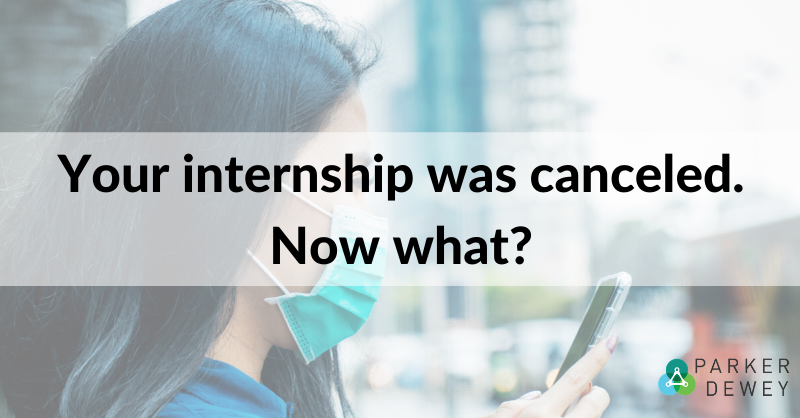
What to do if your Summer Internship was canceled
It’s no secret that COVID-19 is impacting everything. As a result of the unknown, many companies have canceled internships and rescinded post-graduation job offers.
What should you do if your program was canceled or if you hadn’t yet secured a job? Read on for an overview of the options available to you despite the global pandemic.
Micro-Internships on Parker Dewey
Micro-Internships are short-term, paid, professional projects that can be completed remotely. Parker Dewey’s Micro-Internship network is available to all college students from U.S. based institutions (including international students provided they have the right paperwork and approval from their school), and provide an effective way to demonstrate skills, build professional networks, and explore career paths while getting paid. In addition, the network is open to recent graduates who are trying to land the right full-time role.
Pros: Free for students, and you get paid! All projects and companies are vetted by Parker Dewey, and we handle the paperwork so you never have to negotiate or chase down a payment. Companies also use Micro-Internships to build relationships with highly-motivated college students. As a result, many of these projects can lead to full-time roles.
Cons: Opportunities can be competitive, especially right now. Even though they are short-term, students need to put their best (virtual) foot forward with a detailed profile and thoughtful responses to the short-answer questions asked by the companies to improve their chances of being selected.
Get started now by signing up for a free Career Launcher account
Virtual Internship Program from Upkey
The VIP from Upkey is a new program in response to COVID-19. Participants of VIP will engage in learning opportunities to build career-ready skills required in the workplace. The program is also open to high school seniors
Pros: [UPDATE AS OF 6/4/20] The program can provide credit hours but is no longer offering a $1,000 stipend to those selected to help ease the pain of a traditional internship that was canceled.
Cons: Space is limited to 1,000 students, and you’ll focus on general business acumen versus role-specific skills you would gain from a traditional internship.
Get started now by applying for an invitation to the program
Summer school with projects from Riipen
Riipen connects schools with companies interested in engaging with student teams for longer-term group projects. If your school is partnered with Riipen, faculty can sign their students up for in-class projects that allow you to gain work experience while also earning credits.
Pros: You’ll work on a professional project with help from classmates and guidance from your instructor.
Cons: There’s no payment as these projects are instead done for credit as part of your coursework so you'll need to be enrolled in a course that offers Riipen as part of its curriculum.
Get started now by asking your school if it is a Riipen user
Online Career Fair
Online Career Fair is a free mentoring platform where students engage with professionals in virtual coaching sessions. These conversations help students build relationships with professionals in industries aligned to a student’s goals, and can provide the foundation for internships and full-time roles in the future.
Pros: An effective, way to expand your network and gain insights in a less formal setting than an information session. In addition, volunteer coaches participate because they view this as a tool for their companies to recruit college students.
Cons: All coaches are volunteers and students are given a limited number of credits to use for sessions per cycle. Therefore, the number of available sessions with the coaches can be limited.
Get started now by joining Online Career Fair
WayUp
WayUp is a curated job board that helps connect college students with companies searching for college-educated, entry-level talent. Their platform is open to all students and includes both traditional internships and full-time roles.
Pros: WayUp has plentiful resources and blog articles to help you land your first job.
Cons: Because companies have to pay to connect with you, you'll likely miss out on those companies that haven’t included participation in their budgets.
Get started now by creating an account on WayUp
Handshake, Symplicity, Gradleaders
These job boards partner directly with colleges and universities to create curated job posts for each school’s network of current students and alumni.
Pros: Already utilized by colleges and universities, so it’s likely you already have an account through your office of career services.
Cons: Companies choose the schools at which they advertise open internship and entry-level roles so you won’t have access to all opportunities. In addition, these platforms are designed specifically for campus recruiters, so it is unlikely you’ll find opportunities beyond traditional internships or full-time roles. Premium employer users can also reach out to you directly, so your personal information may be accessible to companies you’re not interested in.
Get started now by asking your school if it is uses a job board
Scholars
Scholars is a recruiting platform that matches candidates to employers. Unlike other job boards, employers will reach out to you first instead of waiting for you to apply.
Pros: Once you create your profile, recruiters can find and contact you directly. There is also no cost to students as employers pay to access your information.
Cons: Because this platform works in reverse of most job boards, you’ll need to be sure your profile contains the skills employers are looking for in order to be invited to apply.
Get started now by creating a profile on Scholars
Marketing Apprenticeships by Acadium
Acadium helps college students learn and build the skills needed for a career in digital marketing. Training is free, but a paid four-month accelerator program is also available that guarantees employment.
Pros: In addition to free courses on digital marketing, you’ll also have the opportunity to work directly with a business for a three-month apprenticeship.
Cons: Acadium only offers training and apprenticeships for people interested in digital marketing. The apprenticeship and work completed during the accelerator program is unpaid.
Get started now by applying for a digital marketing apprenticeship on Acadium
Upwork
Upwork is a worldwide freelance network that connects companies with individuals to work on remote projects. Freelance jobs are available across industries and business roles and range in pay from a few dollars per hour to competitive wages.
Pros: Upwork gives you an opportunity to work on paid projects for companies worldwide.
Cons: Upwork freelancers pay a variety of fees to use the site, which can make it difficult to understand your actual income as a first-time freelancer. Many projects also require you to bid to get the job, with companies looking for the best talent at the lowest price. In addition, should a potential employer want to hire you directly, the company will also need to pay an additional fee tied to your annual salary, making it unlikely that these projects will lead to full-time opportunities for college students.
Get started by creating an account on Upwork
LinkedIn Learning
LinkedIn is the world’s largest professional network, including online networking opportunities, job posts, and learning modules to attain professional skills. For a limited time, some courses from the 15,000+ video course library are available for free to LinkedIn users. You can also sign up for a 30-day LinkedIn Learning trial or check if your school is a subscriber.
Pros: You can build your professional skill set while earning certificates that can be added to your LinkedIn profile.
Cons: You won’t get to learn on-the-job while doing actual work with professionals, and not all courses are free after the initial 30-day trial.
Get started now with free LinkedIn Learning courses to help you navigate the impact of COVID-19
Volunteer through sites like VolunteerMatch.org
In a time of crisis, nothing feels better than giving back to your community. You can find volunteer roles nationwide, including virtual volunteer roles, that align with your skills and interests.
Pros: Volunteer experience is a great way to build relationships, develop professional skills, and stand-out during your full-time job search.
Cons: Most volunteer work is unpaid, and many organizations have strict guidelines.
Get started now by creating an account on VolunteerMatch.org
While not ideal, even if your internship was canceled for the summer of 2020 you do have options to gain skills, earn income, and get prepared for life after college. Canceling the internship program was a difficult decision for these companies, and many are looking for ways to help you, so most importantly you should keep in touch with the company you planned to work for and check-in frequently as the situation continues to evolve. They may be open to short-term Micro-Internship opportunities, have new programs they plan to launch, or have additional resources available to help you learn and grow.
For more ideas on how to make the most of your summer in spite of campus closures and cancellations, watch our webinar replay of Making the Most of Summer 2020.




